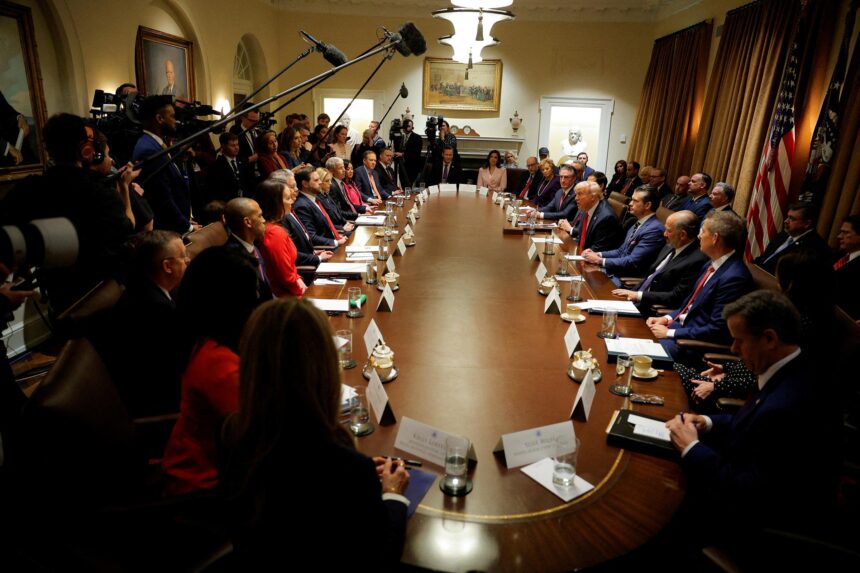After staffing the wealthiest presidential Cabinet in modern American history with energy and banking titans, President Donald Trump has spent his first three months in office boosting those industries while dismantling long-established guardrails against government corruption.
A CNN review of Trump’s actions as he approaches the 100-day mark of his presidency found that as his administration has slashed the federal workforce and shaken the global economy with tariffs, the president’s team has made changes that could also directly benefit his Cabinet members or their former companies.
At the same time, by gutting traditional oversight bodies and embracing historically lax ethics rules, Trump has enabled conflicts of interest and greased the revolving door between government and the private sector. At least eight nominees for executive branch positions would have been banned or had limited roles under previous administrations – including Trump’s first term – due to their recent work as lobbyists, according to an analysis by the watchdog Campaign Legal Center
Some potential conflicts have played out in plain view – like when Trump used the White House lawn last month to produce what seemed like an elaborate ad for key adviser and top donor Elon Musk’s struggling Tesla brand. The Trump administration has also cleared the way for Musk’s Starlink business to win new government contracts.
But other examples of possible conflicts are found deep in Cabinet members’ ethics reports, such as Energy Secretary Chris Wright’s disclosure that he would receive a million-dollar bonus – after his swearing-in – from the fracking company he founded, led and now plays a role in regulating.
Even as they’ve agreed to divest, some Cabinet members have found a loophole: giving control of certain assets to their adult children. Commerce Secretary Howard Lutnick handed the reins of his financial services firm Cantor Fitzgerald to his 27-year-old son, while Health and Human Services Secretary Robert F. Kennedy Jr. has said he would give his interest in litigation against a vaccine maker – part of an industry he is now tasked with regulating – to his adult son.
Some of Trump’s policies also could help his own business interests. By establishing a strategic Bitcoin reserve, the president is backstopping the value of the cryptocurrency, enriching existing holders of the asset, some of whom spent millions helping reelect the president. Meanwhile, Trump and his family have moved to expand their own crypto interests. And this week, Trump sent the value of his personal meme coin soaring by promising its top buyers a chance to dine with the president next month.
Many of the Trump administration’s early actions have pushed priorities that Republicans have sought for years, and the White House says its moves to slash regulations are needed to reduce spending and eliminate government inefficiency.
“The people elected me to do the job, and I’m doing it,” Trump said in March. “My administration will reclaim power from this unaccountable bureaucracy.”
But from cryptocurrency and energy policies to efforts as niche as rural internet access, some of the administration’s moves also closely align with the financial interests of his top advisers and the president himself.
“This administration seems entirely indifferent to ethics, and that contrasts certainly with the past several administrations, including Trump one,” said Richard Briffault, a Columbia University law professor who studies government ethics. “The level of complete indifference to it takes us back to before Watergate.”
Within weeks of beginning his second term, Trump flouted many of those decades-old protections – including by firing more than a dozen inspectors general and dismissing the head of the government’s ethics watchdog. He also signed an order making it easier for lobbyists to join agencies overseeing industries they used to represent.
The United States has spent years building up an “ethics infrastructure,” Briffault said. “In less than 90 days, this administration has been tearing (it) down.”
Trump’s unprecedented moves come as his Cabinet includes some of the richest people to ever hold the reins of power in the federal government. Many came straight from positions of power in key industries.
CNN analyzed dozens of financial disclosures and ethics statements filed by presidential appointees to track the wealth and potential conflicts of interest among Trump’s Cabinet members. The disclosures offer a limited picture of nominees’ finances: Officials are only required to list their assets in broad ranges.
Still, Trump’s leadership team appears to eclipse the wealth of any previous Cabinet going back decades. Of 21 Cabinet members, seven reported holding at least $10 million in assets, and some are even billionaires.












